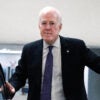Two Big Tech CEOs apologized to grieving parents Wednesday while others insisted to senators that they are working to prevent exploitation of teens and children on their social media platforms.
The CEOs testifying at the Senate Judiciary Committee hearing, titled “Big Tech and the Online Child Sexual Exploitation Crisis,” included Jason Citron of Discord Inc.; Mark Zuckerberg of Meta, parent company of Facebook and Instagram; Evan Spiegel of Snap Inc.; Shou Chew of TikTok Inc., and Linda Yaccarino of X Corp., formally Twitter.
Several lawmakers questioned the tech chiefs about stories of minors who used social media platforms where they were bullied, blackmailed, accessed illegal drugs, and introduced to sexual predators. In some instances, the minors committed suicide because of these encounters.
The Daily Signal depends on the support of readers like you. Donate now
Families of victims, seated in the audience for the Judiciary Committee hearing, applauded lawmakers at several points.
The committee’s Republican and Democrat members showed rare unity, with several senators from both sides calling for the repeal of Section 230 of the Communications Decency Act, which makes social media companies immune from liability for content posted by users.
Here are six key takeaways from the Senate hearing.
1. Hawley Spurs Zuckerberg to Apologize
Early in the hearing, Meta’s Zuckerberg denied any correlation between use of social media and teen mental health.
“With so much of our lives spent on mobile devices and social media, it’s important to look into the effects on teen mental health and well-being,” Zuckerberg said. “I take this very seriously. Mental health is a complex issue and the existing body of scientific work has not shown a causal link between use of social media and young people having a worse mental health outcome.”
Later, Sen. Josh Hawley, R-Mo., who has crusaded for years against Big Tech giants, accused Zuckerberg of misleading Congress.
“Your own study says that you make life worse for 1 in 3 teenage girls. You increase anxiety and depression. You are here testifying to us in public that there is no link,” Hawley told Zuckerberg.
“You’ve been doing this to us for years,” the Missouri Republican added. “For years, you’ve been coming in public and testifying under oath that there is absolutely no link, your product is wonderful, the science is nascent, full speed ahead, while internally, you know that your product is a disaster for teenagers.”
Zuckerberg replied, “That’s not true.”
Hawley asked, “And you go right on doing what you’re doing. Right?
The audience applauded.
Hawley added, “Those are facts, Mr. Zuckerberg, those are not questions.”
Zuckerberg responded, “That’s a bizarre fact.”
When Hawley asked whether the families of any victims of his social media sites were compensated, Zuckerberg replied, “I don’t believe so.”
“There are families of victims here today,” Hawley said. “Will you apologize to the victims?”
“Well,” Zuckerberg said at first, and Hawley jumped in to urge: “They are here, you are on national television. Would you like to apologize to the victims who have been harmed by your product?”
The audience applauded again. Hawley again asked: “Would you like to apologize?”
At that, Zuckerberg stood up from his seat and turned around to the audience in the Senate hearing room, where parents and other relatives stood with photos of their dead loved ones.
Barely audible because he was facing away from his microphone, Zuckerberg spoke to the crowd.
“I’m sorry for everything you’ve all gone through,” Zuckerberg told the families. “It’s terrible. No one should have to go through the things that your families have suffered, and this is why we invest so much and we are going to continue doing industrywide efforts, to make sure no one has to go through the things your families have had to suffer.”
2. TikTok, Taylor Swift, Tiananmen Square
Also facing questions was Chew, CEO of TikTok, a social media platform that started in China, where its Beijing-based parent company ByteDance is headquartered.
Chew said several times during the hearing that TikTok isn’t a Chinese company and that he is from Singapore. He denied sharing any user data with Chinese intelligence officials.
Sen. Ted Cruz, R-Texas, pressed Chew on what users of TikTok can access.
“If you look at what is on TikTok in China, you are promoting, to kids, science and math videos, educational videos, and you limit the amount of time they can be on TikTok,” Cruz said. “In the United States, you are promoting, to kids, self-harm videos and anti-Israel propaganda. Why is there such a dramatic difference?”
Chew challenged the accuracy of the study cited by Cruz.
“That is not accurate. TikTok is not available in China. It is a different experience,” Chew said.
Cruz shot back: “You have a company that is essentially the same, except it promotes beneficial content instead of harmful materials.”
“That is not true,” Chew responded. “We have a lot of science and math here on TikTok.”
Cruz followed up with data comparing what Instagram users can access with what TikTok users can access.
“The differences were striking,” the Texas Republican said.
“For something like ‘hashtag Taylor Swift’ or ‘hashtag Trump,’ researchers found roughly two Instagram posts for every one on TikTok. That’s not a dramatic difference,” Cruz said, adding:
The difference jumps to 8-1 for the hashtag Uyghur. And it jumps from 30-1 for the hashtag Tibet. And it jumps 57-1 for the hashtag Tiananmen Square. And it jumps to 174-1 for the hashtag Hong Kong protest.
Why is it on Instagram that people can put up a hashtag Hong Kong protest 174 times compared to TikTok? What censorship is TikTok doing at the request of the Chinese government?
Chew responded: “None. Senator, the analysis is flawed. It has been debunked.”
Apparently as a quiz, Cruz asked Chew: “What is Tiananmen Square?”
Chew replied: “There was a massive protest during that time.”
Tiananmen Square in China’s capital, Beijing, was the site of a large, pro-freedom protest from April to June 1989. What Chew didn’t say is that the Chinese military killed hundreds and possibly thousands of pro-democracy demonstrators in dispersing the crowd that June 4, with casualty reports varying.
However, when Sen. Tom Cotton, R-Ark., later asked whether more than a protest occurred at Tiananmen Square, Chew responded that there was a “massacre.”
3. Biden ‘Collaboration’ With TikTok?
Cotton raised the potential of collaboration between the Biden administration and TikTok, noting that Biden White House officials and the president’s reelection campaign have TikTok accounts.
“Has the Federal Trade Commission sued TikTok during the Biden administration?” Cotton asked Chew.
Chew first said that he can’t talk about potential litigation.
Cotton replied, “The answer is no.”
Referring to Federal Trade Commission litigation against X and Meta, Cotton said: “Ms. Yaccarino’s company is being sued, I believe. Mr. Zuckerberg’s company is being sued, I believe.”
The Arkansas Republican later brought up the fact that TikTok lobbyists have been frequent visitors to the White House during the Biden presidency.
“Public reports indicate that your lobbyists visited the White House more than 40 times in 2022. How many times did your company’s lobbyist visit the White House last year?” Cotton asked.
Chew replied, “I don’t know, Senator.”
Cotton noted that President Joe Biden’s reelection campaign and the Democratic National Committee have TikTok accounts.
“By the way, they won’t let their staffers use their personal phones. They have separate phones that they only use TikTok on,” Cotton noted, referring to data security.
Chew’s only response: “We encourage everyone to join.”
“Have you or anyone at TikTok communicated with or coordinated with the Biden administration, the Biden campaign, or the Democratic National Committee to influence the flow of information on your platform?” Cotton asked.
Chew didn’t answer yes or no, but said: “We work with any creators. It’s all the same process.”
Cotton sounded less than satisfied.
“What we hear is we have a company that is poisoning the minds of America’s children, in some cases driving them to suicide, that the Biden administration is taking a pass on at best, [and] at worse is working in collaboration with,” Cotton said.
4. Butler Prompts Snapchat Apology
Sen. Laphonza Butler, D-Calif., was not going to allow Zuckerberg to be the only CEO to apologize. Butler, appointed in October after the death of Sen. Dianne Feinstein, asked Spiegel about minors using Snapchat to obtain illegal drugs.
“Mr. Spiegel, there are a number of parents whose children have been able to access illegal drugs on your platform. What do you say to those parents?”
Spiegel first responded: “Senator, we are devastated—”
Butler cut off the Snapchat CEO, saying: “To the parents.”
Spiegel turned slightly around in his chair but didn’t move far from his microphone, so his apology was more audible.
“I’m so sorry that we have not been able to prevent these tragedies,” Spiegel said. “We work very hard to block all search terms related to drugs on our platform. We proactively look for and detect drug-related content. We remove it from our platform, preserve it as evidence, and then refer it to law enforcement for action.”
5. ‘Premier Sex Trafficking Site’
Sen. Marsha Blackburn, R-Tenn., mostly targeted Zuckerberg’s platforms, Facebook and Instagram, for allowing young people to access sexually explicit content.
“It appears you’re trying to be the premier sex trafficking site in this,” Blackburn said.
Zuckerberg replied, “Of course not, Senator, that’s ridiculous.”
Blackburn said, “It is not ridiculous.”
Zuckerberg defended Facebook and Instagram, saying: “We don’t want this content on our platform.”
Blackburn: “Why don’t you take it down?”
Zuckerberg: “We do take it down.”
Blackburn: “We are here because we need you all to work with us.”
After some crosstalk between the two, Blackburn said: “The problem is we’ve been working on this for over a decade. You have an army of lawyers and lobbyists that have fought us on this every step of the way.”
6. ‘Blood on Your Hands’
Sen. Lindsey Graham, R-S.C., the ranking member of the Judiciary Committee, said the Big Tech companies should be regulated.
“Social media companies, as they are currently designed and operated, are dangerous products,” Graham said. “They are destroying lives, threatening democracy itself. These companies must be reined in, or the worst is yet to come.”
Graham referred to the story of a teenage boy who was blackmailed through social media messages and eventually killed himself.
“Mr. Zuckerberg, you and the companies before us—I know you don’t mean to be so—but you have blood on your hands,” Graham said, to applause in the hearing room. “You have a product that is killing people.”
Graham noted that cigarettes and guns face certain regulations because of harms they can cause.
“What do you do with dangerous products? You either allow lawsuits, you pass statutory protections to protect consumers, or you have a commission of sorts to regulate the industry in question,” Graham said.
“To take your license away if you have a license, to fine you. None of that exists here,” Graham said. “There is no regulatory body to deal with the most profitable, biggest companies in the history of the world.”
“They can’t be sued, and there is not one law on the books that is meaningfully protecting the American consumer,” he said. “Other than that, we are in a good spot.”
Have an opinion about this article? To sound off, please email letters@DailySignal.com, and we’ll consider publishing your edited remarks in our regular “We Hear You” feature. Remember to include the URL or headline of the article plus your name and town and/or state.




























